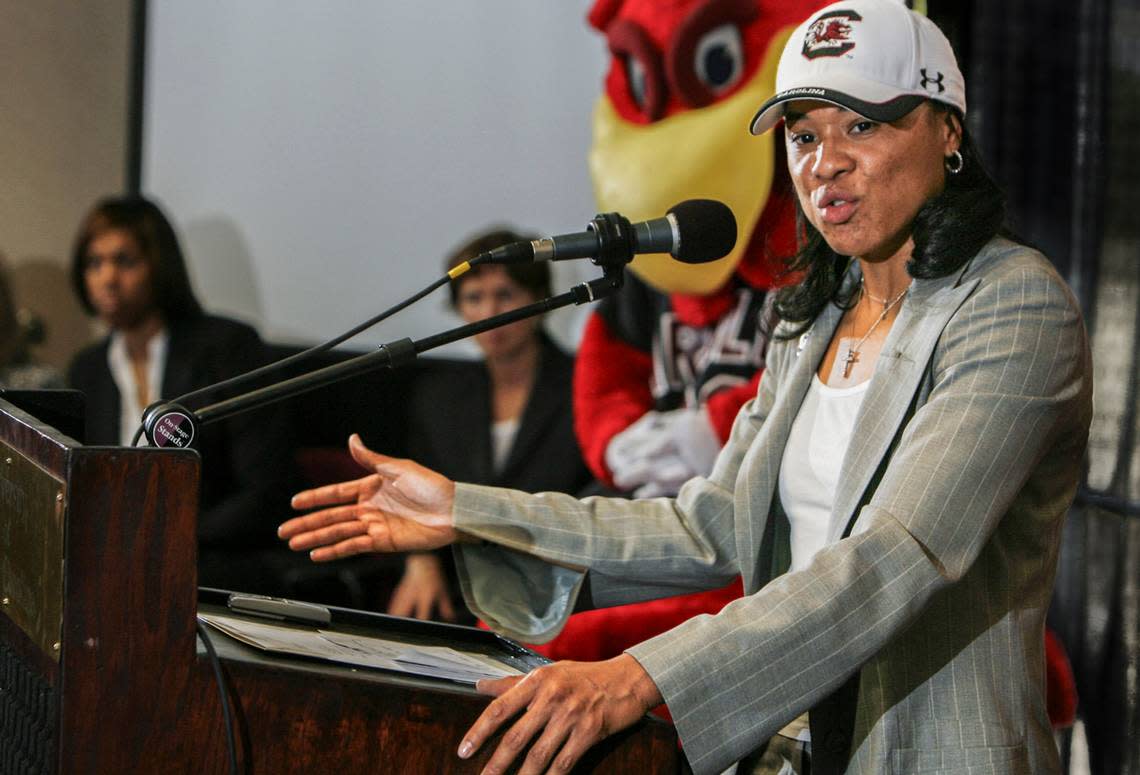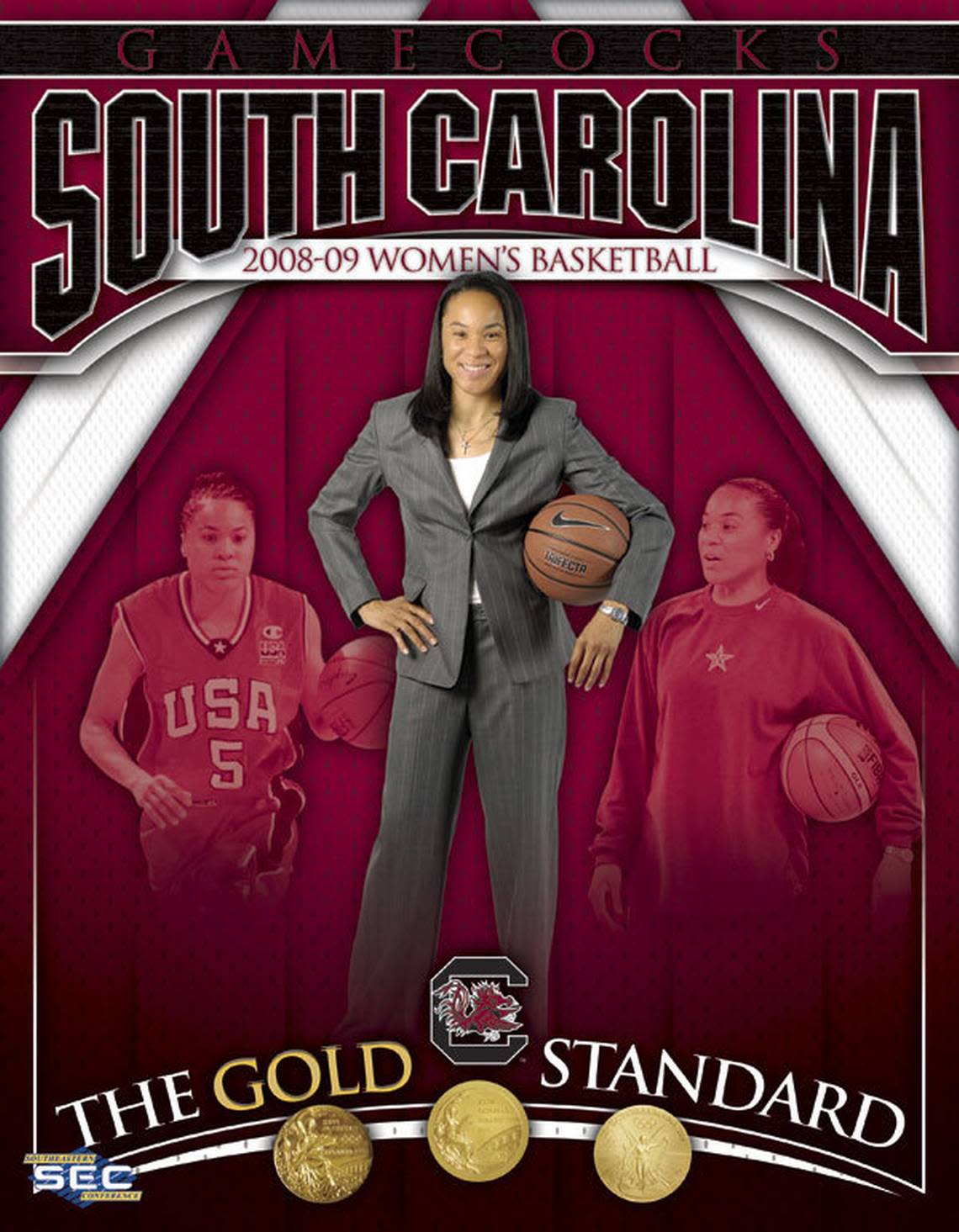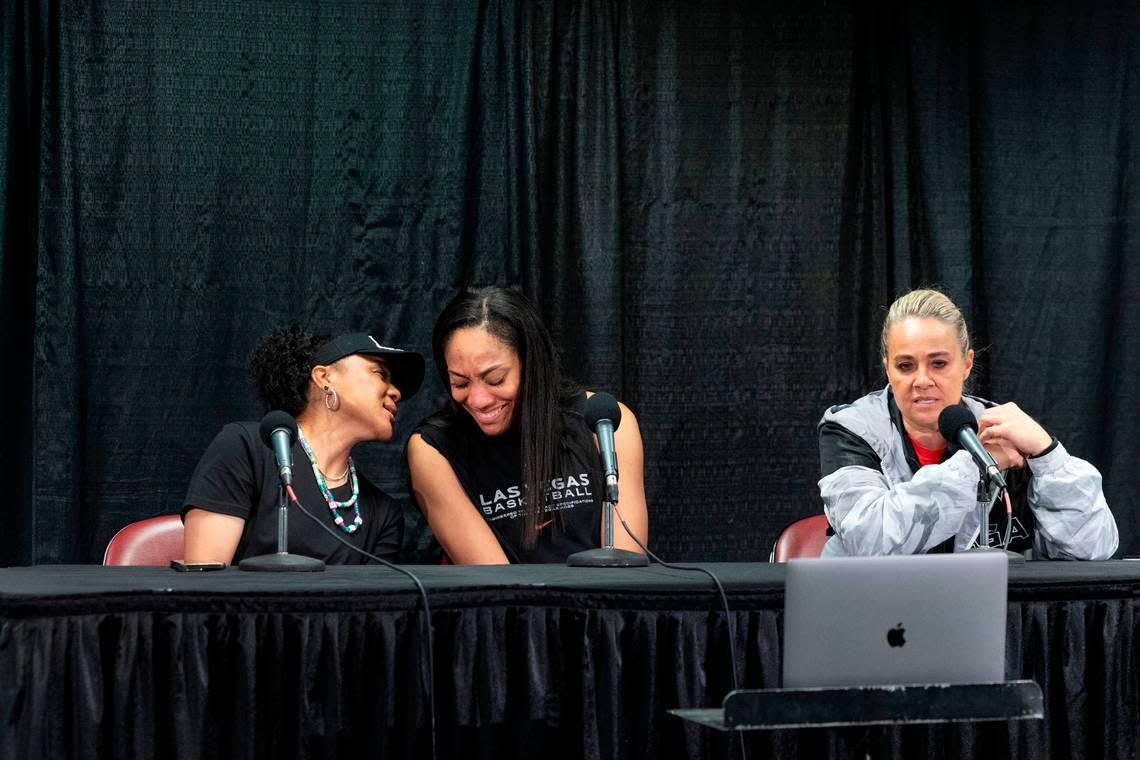20 years ago, Dawn Staley served as U.S. flag bearer. How it influenced her path to USC
As Dawn Staley prepared to enter the Olympic Stadium in Athens on Aug. 13, 2004, a man approached her to fasten a harness and the American flag to her person. He instructed her to walk six feet in front of the United States delegation.
Alone.
It was Staley’s third and final Olympics as a player. Her fellow captains selected her as the United States’ flag bearer for that year’s Games in Greece. At the time, only 22 Olympians in the country’s history had received the honor. And Staley — the first basketball player and second Black woman selected — was one of them.
The man took a step forward.
“We are the USA,” he told her. “You keep your head up, walk prideful and never dip the flag.”
This interaction has stayed with Staley for decades. She mentioned it in her Naismith Hall of Fame induction speech in 2013. And she seems to have lived by it for the last 20 years.
Every “first” on her résumé commemorates another instance where she walked alone. Alone into rooms designed without her in mind. Alone and much further than six feet ahead of the rest.
First Black coach to win multiple NCAA Division I championships.
First USC women’s coach to earn $1 million per year (she was set to earn $3.1 million in 2024).
First former Naismith Player of the Year to win the Naismith Coach of the Year award (four times).
The 2024 Paris Olympics open Friday night, and Staley will be there as part of the Presidential Delegation led by First Lady Jill Biden. Carrying the United States flag at the 2004 opening ceremony was an opportunity Staley never imagined for herself as a young Black girl from the Raymond Rosen Housing Projects of North Philadelphia. But with the infinite wisdom of hindsight, it was one she seemed destined for.
“I don’t think (they picked me) for anything I’ve done on a basketball court,” Staley said in 2004. “I think it was for helping others achieve their goals and dreams.”
Twenty years, 15 WNBA Draft picks, three NCAA championships and two Naismith Players of the Year later, Staley has helped countless young women achieve their dreams. The success of stars like A’ja Wilson, Aliyah Boston and Kamilla Cardoso can largely be attributed to Staley’s guiding hand. A hand that was brought to South Carolina, in large part, because of that night in Athens, Greece.

From Athens to Columbia
Former South Carolina athletic director Eric Hyman first saw Staley on Jan. 12, 1991.
Her Virginia Cavaliers were battling the N.C. State Wolfpack in what was then regarded as one of the best games in women’s basketball history. It took UVA three overtimes to overcome the home team 123-120. The final score set a women’s NCAA record for the most combined points by two teams.
Staley, then a junior, recorded the first triple-double in conference history (24 points, 10 rebounds, 11 assists).
“I saw this little point guard,” Hyman told The State in January, chuckling, “and she really impressed me.”
Little did Hyman know he would be offering her the women’s basketball head coaching job at South Carolina 17 years later.
The Susan Walvius era at USC came to an end in April 2008 after 11 seasons. Hyman had a few coaches in mind to fill the position, but Staley wasn’t one of them. Until her agent, Tom Cross, called.
South Carolina interviewed four candidates: North Carolina’s Hall of Fame coach Sylvia Hatchell, Chattanooga’s Wes Moore, Tennessee associate head coach Holly Warlick and then-Temple head coach Staley.
Hyman considered the latter three finalists, as Hatchell used the opening at South Carolina to leverage a contract extension with UNC.
Staley visited Columbia the last week of April, but things didn’t go quite as planned.
“I had community members over, we had lunch over at our house, and I never really got the true connection I’d like to have with a coach I’m trying to hire,” Hyman said.
He knew there had to be more to Staley than he saw that day. He thought of that tenacious point guard he saw in Raleigh all those years ago. The success she had in the WNBA and at Temple.
But perhaps more than any of that, he thought of the woman he’d seen on his television screen on Aug. 13, 2004. The United States flag bearer for the Athens Olympics. The first basketball player chosen by her compatriots to carry the symbol of their nation for all the world to see.
“That, to me, said an awful lot about her,” Hyman said. “I didn’t connect with her to the extent I wanted to, but I said, ‘There has to be more substance to her.’”
So Hyman met Staley where she was at. He flew to Philadelphia, hoping she’d be more amenable to deep conversations on her home turf. She showed him the city that made her, all the while fielding greetings and questions from those who recognized her on the street.
“That made a real strong impression upon me,” Hyman said. “... Based on carrying the American flag at the Olympics, based on the success she had at Temple, based on watching her as a guard playing for Virginia, all those things added up to me.”
Staley was formally announced as the head coach of South Carolina women’s basketball May 7 of that year.
The 2008 USC women’s basketball media guide cover displayed three pictures of Staley — two in Team USA gear and one in a gray pinstriped pantsuit. She stood atop images of her three Olympic medals. Between her feet and the hardware read a flashy tagline: “The Gold Standard.”

‘Dream Merchant’
The day before the 2004 opening ceremony, broadcaster Katie Couric announced Staley would be the United States’ flag bearer on NBC’s “Today” show in Athens.
“I am still in total disbelief,” Staley said at the time. “I’m not an emotional person, but this makes me emotional. I’m invisible most of the time. I’m not even a conversation starter. I usually do all my talking on the court, so it’s an honor that so many other sports see me in a different light.”
Since then, Staley has leaned further into off-court leadership positions. She has established herself not only as an incredibly accomplished coach but also as an advocate for equity and her self-prescribed title of “dream merchant.”
In addition to pioneering the American professional women’s basketball scene, Staley has fought for pay equity, racial justice and fair media coverage of her predominantly Black teams.
She has negotiated multimillion-dollar contracts for herself at South Carolina. She has challenged powerful companies and media conglomerates to invest in women’s basketball (see Aflac’s $55,000 rewards for winning the skills challenge and 3-point contest at the 2024 WNBA All-Star weekend). She has pushed back against offensive descriptions of her players.
Her social awareness, track record of action and shared lived experience with the young women she coaches have helped Staley forge rich, long-lasting relationships.
Wilson — a two time WNBA champion and league MVP — returned to Columbia in May for a preseason game between her Las Vegas Aces and the Puerto Rican national team. It was the first time since 2018 that she had played at Colonial Life Arena, where there is an 11-foot bronze statue of her, thanks in large part to an effort spearheaded by Staley. Wilson’s historic homecoming prompted her to reflect on her relationships with Staley (whom Wilson refers to as her “second mom”) and Aces coach Becky Hammon.
“I can’t thank these two enough for the time that they’ve spent, the talks that we’ve had, the realness,” Wilson said. “... Without them, I wouldn’t be a champion. I would not be the winner and the leader that you see today. The outspoken woman that y’all see today. … This is greatness.”

A month earlier, Cardoso shared her gratitude for Staley after USC won the 2024 NCAA championship.
“Since the first day I got to South Carolina, she’s been working so hard to get me ready and prepared for moments like this,” the 2024 Final Four Most Outstanding Player said. “I’m just so thankful to have her as a coach. She’s an inspiration for me and a lot of young girls out there.
“It means a lot just to play — just to learn from her,” starting point guard Raven Johnson added. “… I take pride in what she does for us, on and off the court, not just basketball.”
On July 11, Staley accepted the Jimmy V Award for Perseverance at the 2024 ESPY Awards. She became the first individual woman to receive the honor since Kay Yow in 2007. The award recognized Staley’s lifelong commitment to elevating women’s basketball and her effort in the fight against cancer.
In her acceptance speech, Staley revealed the source of her strength and courage to demand more for women, cancer patients and herself. It all stems from fighters such as her late friend and former USC assistant Nikki McCray-Penson, sister Tracy Underwood, a young cancer patient named Blakely, and her players at South Carolina.
“How do I not fight injustice when I ask them to do things the right way?” Staley said. “How do I not fight for fairness when I ask them not to cheat themselves, not to cut corners. How do I not fight for equity when I tell them they can climb as high as they want, they can be all that they want? How do I not fight pay disparities when I do the same job and get paid less, but win more?”
She paused as the crowd reacted with resounding applause.
“They’re watching me,” Staley continued. “I can’t ask them to stand up for themselves if I’m sitting down. Nor can I ask them to use their voice to affect change if I’m only willing to whisper. So when someone tells me to shut up and coach, I simply say, ‘No, I have a job to do.’ ”
"If they can stand strong in the rings with unwavering bravery and go toe to toe with only faith as their armor ... how can I not?"
Dawn Staley accepts the Jimmy V Award for Perseverance
Join the fight with the @TheVFoundation here: https://t.co/1ZqRiuZrHF pic.twitter.com/p7FmNmIOxU— ESPN (@espn) July 12, 2024






